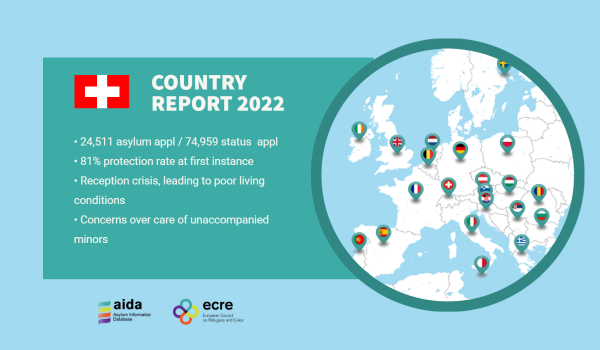The updated AIDA Country Report on Switzerland provides a detailed overview on legislative and practice-related developments in asylum procedures, reception conditions, detention of asylum seekers, content of international protection, as well as procedure for and content of status S protection in 2022.
In 2022, the authorities registered 24,511 applications for international protection in Switzerland, a 64% increase from 14,928 in 2021. This notably included 2,450 applications from unaccompanied minors, mostly from Afghanistan, a 148% increase from 2021. The overall recognition rate at first instance was 81%, with 45% refugee status and 36% temporary admission. Over 12,200 cases were still pending at first instance at the end of 2022. In the same time, out of 3,703 applications for humanitarian visas, only 142 were accepted, mainly for Afghan nationals, and 641 persons were resettled. As of December 2022, the government temporarily halted the resettlement programme due to lack of capacity.
Concurrently, the authorities received 74,959 registered applications for status S, of which 72,611 were granted. 74,661 residence permits were issued during 2022. As of 31 December 2022, there were 62,280 persons benefitting from status S in Switzerland. The status is in law broader regarding third country nationals, as it includes all persons with a valid short stay or residence permit in Ukraine and who are unable to return to their country of origin. Persons with a protection status in another safe country (e.g. temporary protection in an EU Member State) cannot receive status S in Switzerland even if they have renounced this previous protection, unless they were issued such protection in a country particularly affected by the Ukraine crisis, assessed on a case by case basis.
The rise in asylum applications in a context of already highly accelerated and rushed asylum procedures put the spotlight on the weaknesses of the accelerated procedure applied by default in Switzerland; more persons were assigned to the extended procedures. The rise in applications also led to a reception crisis in Switzerland, with conditions in some federal centres becoming untenable. To increase capacity, the SEM reallocated spaces in ordinary centres as dormitories and opened approx. 20 temorary asylum centres, while on the other hand reducing the number of residents in federal centres. Most temporary centres consist of military barracks, or military multi-purpose or sports halls, in which personal and family sphere cannot be adequately respected. The current plan is to continue with use of more military buildings.
Due to a rise in applications also specific to this group, the SEM introduced acceleration measures for asylum procedures concerning unaccompanied minor asylum seekers; in this context, NGOs have recalled the State’s obligation regarding child protection, particularly re. accommodation, access to care and asylum procedures. In a report drawing upon visits in asylum centres in 2021 and 2022, the National Commission for the Prevention of Torture expressed severe concerns regarding the situation of unaccompanied minors who cannot receive personalised support since at least February 2022, and concluded that the current treatment of minors is in violation of the UN Convention on the Rights of the Child.
The Federal Administrative Court took a number of key decisions regarding transfers of asylum seekers and BIPs. In particular, the Court lifted the obligation, set out in 2019, for the government to obtain individual guarantees from the Italian authorities in the case of take charge Dublin procedures concerning persons with serious health problems; the obligation is maintained for take back procedures due to the risk of being excluded from accommodation. Also regarding Dublin transfers, in March 2023 the Court assumed all persons returned to Croatia will have access to the asylum procedure, denying the existence of systemic deficiencies and clarifying the transfer could only be suspended in exceptional cases. Regarding BIPs from Greece applying for asylum in Switzerland, the Court held that in general persons can in be transferred back; however, this can only occur in case of favourable conditions regarding families will children; for extremely vulnerable persons, the removal could be considered reasonable only in exception cases where they are particularly favourable circumstances.
Lastly, following an ECtHR case against Denmark, in a leading judgment the Federal Administrative Court ruled that the statutory waiting period imposed on persons with temporary admission for family reunification procedures is no longer strictly and automatically applicable. Applications for family reunification must already be examined after one and a half years if further waiting is disproportionate in individual cases.
For further information:
- Find comparative information in the Asylum Information Database (AIDA) managed by ECRE

